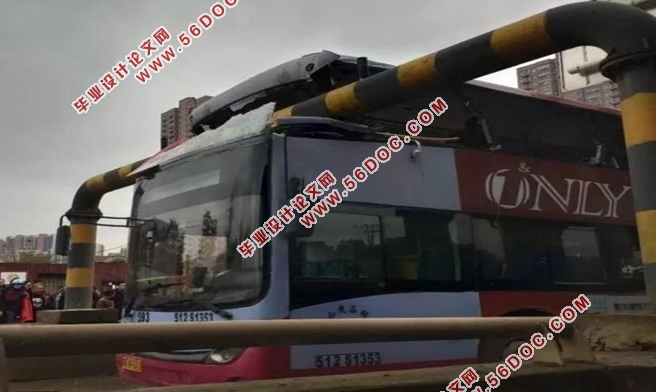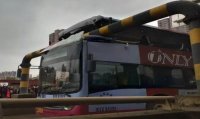城市桥隧路段限高架优化设计(任务书,开题报告,论文说明书21000字)
摘 要
城市桥隧路段往往是城市交通的咽喉,常常会设置限高架,以实现对桥梁、隧道主体结构的保护。但现有的限高架设置存在以下问题:(1)只设置了警示限高架,(2)只设置了防撞限高架,(3)警示限高架与防撞限高架均进行了设置,但间距不合理,设施功能不合理;均不能很好地实现对桥梁、隧道主体结构及驾驶人、车辆等的良好保护,导致交通事故频发,造成重大的人民生命及财产损失。本文分析了城市桥隧限高防护体系的重要程度,(1)得出如下顺序防护优先级别:桥隧主体结构>防撞限高架>驾驶人>车辆>警示限高架;(2)然后再分别对警示限高架、防撞限高架进行了视线诱导设计及初步结构设计,(3)最后对限高架之间的间距进行了分析。(4)同时通过视距、视区分析得出二级限高架系统能较好地实现对桥梁/隧道主体结构、驾驶人、车辆的防护,确保限高架系统能发挥最大功效。
关键词:交通安全;限高架;事故;改善设计
ABSTRACT
Urban bridge and tunnel sections are often the throat of urban traffic. Limited viaducts are often set up to protect the main structure of bridges and tunnels. However, the existing limited elevation has the following problems: (1) only warning limit elevation, (2) only anti-collision limit elevation, (3) warning limit elevation and anti-collision limit elevation have been set up, but the spacing is unreasonable and the function of facilities is unreasonable; they can not achieve good protection of the main structure of bridges, tunnels, drivers, vehicles and so on, resulting in frequent traffic accidents. Major losses of people's lives and property have been caused. In this paper, the importance of the protection system of urban bridge and tunnel height limit is analyzed. (1) The order of priority of protection is as follows: main structure of bridge and tunnel > anti-collision limit elevation > driver > vehicle > warning limit elevation; (2) Then the line-of-sight guidance design and preliminary structure design of warning limit elevation and anti-collision limit elevation are carried out respectively; (3) Finally, the spacing between the two elevations is analyzed. (4) At the same time, through the analysis of visual distance and visual area, it is concluded that the two-level elevated system can better protect the main structure of bridge/tunnel, drivers and vehicles, and ensure the maximum effectiveness of the elevated system.
Key words:Traffic safety; Limited elevation; Accidents; Improvement of design

目录
第1章 绪论 1
1.1目的与意义 1
1.2国内外研究现状 1
1.3研究方法 1
第2章 限高架优缺点及设置依据 2
2.1限高架种类及优缺点 2
2.2国外限高架设置依据 2
2.3香港地区限高架设置依据 3
2.4大陆地区 3
2.4.1铁路行业 3
2.4.2道路行业 4
2.5本章小结 4
第3章 限高架事故现状及原因分析 5
3.1事故现状 5
3.2限高架交通事故影响因素分析 8
3.2.1驾驶人因素 8
3.2.2限高架因素 8
3.3其他方面原因 10
3.4改善对策 11
3.4.1加强交通安全宣传教育 11
3.4.2制定关于限高架相关的法律规则 11
3.4.3对于肇事者进行严厉惩罚 11
3.4.4安排人员进行监管 11
3.5本章小结 11
第4章 桥隧路段限高架评价体系 12
4.1设计理念 12
4.2钢结构的防腐问题 12
4.3成本问题 13
4.4强制性以及警示装置 13
4.5本章小结 13
第5章 城市桥隧限高架优化设计 14
5.1柔性限高架方案 14
5.1.1柔性限高架分析 15
5.1.2该方案适用范围 17
5.2两级限高架方案 18
5.2.1双重限高架、桥隧、人、车辆重要性比较 24
5.2.2适用范围 24
5.3红外限高架方案 24
5.3.1红外测高系统 25
5.3.2智能限高控制系统 26
5.3.3适用范围 28
5.4方案对比 29
5.5本章小结 30
第6章 视距、视区的分析及保障措施 31
6.1决策视距的引入 31
6.2停车视距 32
6.3夜间视野问题 33
6.4另外注意的事项 35
6.4.1限高值的影响因素 35
6.4.2限高值取值 35
6.4.3限高架结构改善 36
6.4.4关于限高预警区的规定 36
6.5本章小结 37
第7章 结论与展望 38
7.1结论 38
7.2展望 38
参考文献 39
致 谢 40
|



